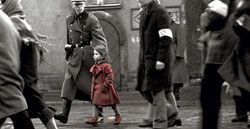By Chris Kavan - 06/25/14 at 06:25 PM CT
It was recently announced that director Scott Cooper (Crazy Heart) with help from screenwriter Ken Nolan (Black Hawk Down) would be adapting the story of the Granite Mountain Hotshots. That is the crew of Arizona wilderness firefighters who lost 19 members in 2013 fighting the Yarnell Hill Fire. It is a heroic story that takes place on the homefront instead of the battlefield (for once) but it also made me think of some of the most moving dramas - and also some of the more lurid films out there - and what makes real-life tragedy so ripe for the film world.
While there are many types of films you can base on "true" events, I'm going to focus on just two: those that will have you crying for days, and those that obviously take advantage of something terrible and spin it in the most shocking manner as possible (often playing fast and loose with the whole "true story aspect"). But in both cases, it all comes from the same place: an event that many might not want to remember, but that is important never to forget.
First, the serious side of things. When we're talking heavy subject matter that deals with a difficult subject, no film comes to mind quicker than Steven Spielberg's Schindler's List. In our modern history, is there any event more galvanizing that The Holocaust?  World War II in general has done more to shape our world than anything else I can think of, and the Nazi plan to eradicate the Jewish people played a major part in that history. Spielberg has a personal connection to the subject, which I think made the film all the more authentic. It is in turn heartbreaking, horrifying, brutal - and it cuts to the bone - or straight to the heart - when you realize this happened. And nothing here is glorified or played for anything but the sheer impact - it's as far from sentimental as you're going to find (and we all know how well Spielberg does sentimental).
World War II in general has done more to shape our world than anything else I can think of, and the Nazi plan to eradicate the Jewish people played a major part in that history. Spielberg has a personal connection to the subject, which I think made the film all the more authentic. It is in turn heartbreaking, horrifying, brutal - and it cuts to the bone - or straight to the heart - when you realize this happened. And nothing here is glorified or played for anything but the sheer impact - it's as far from sentimental as you're going to find (and we all know how well Spielberg does sentimental).
Now, not every movie can be Schindler's List but there are plenty of examples of movies that do the true-to-life drama well: Alive, My Left Foot, Into the Wild, 127 Hours - and I'm sure you can add in many more. These are the films that turn tragedy to triumph.
On the other hand, where we're talking about films that are meant more to shock, one of the first films to come to mind is Henry: Portrait of a Serial Killer. Serial killers especially fit this genre well - but so do cults, unsolved murders and other crimes of their ilk. The reason I pick Henry is because of how just... dirty... it all feels. Michael Rooker  (late of The Walking Dead fame) had his first role as Henry - based (quite loosely) on the real life Henry Lee Lucas. The film is stark, cheap and pulls no punches - yet still hits you in the gut - and makes you want to take a shower to boot. Granted, the film pales in comparison to what pushes the envelope today, but for '86 it was heavy - and I think it's still pretty effective today. Just as we find an emotional connection to the more dramatic films - there is a certain fascination (much like craning your neck to see that car wreck on the side of the road) with witnessing this kind of film.
(late of The Walking Dead fame) had his first role as Henry - based (quite loosely) on the real life Henry Lee Lucas. The film is stark, cheap and pulls no punches - yet still hits you in the gut - and makes you want to take a shower to boot. Granted, the film pales in comparison to what pushes the envelope today, but for '86 it was heavy - and I think it's still pretty effective today. Just as we find an emotional connection to the more dramatic films - there is a certain fascination (much like craning your neck to see that car wreck on the side of the road) with witnessing this kind of film.
Now, you could probably list off three times as many of these type of films as the other - some are done much better (think Zodiac, Summer of Sam or Hollywoodland) while others no better than a typical exploitation flick (The Girl Next Door, Men Behind the Sun or any of the self-titled serial killer films Dahmer, Gacy, Ed Gein, etc.). Whether there is a worthwhile director behind the camera or it's a straight-to-video effort - they all exist usually because of a twisted individual or a horrendous crime - and it's often hard to look away.
There is no shortage of films that deal with tragedy - almost any major event in the last hundred or so years - from assassinations to war to despots, hostage situations, terrorist action or any number of senseless deaths - you will probably be able to find a film about it. So why are we so invested in tragedy? For one, it is a way to preserve history - even the darker aspects of it. Even if it isn't as factual as, say, a memoir or a history text, I think it is much more accessible to many people (though shouldn't be taken as absolute truth). And the other is just the sheer emotional connection - we can feel sadness, revulsion, horror - but we do feel something - and that emotional investment is a big part of why true-life dramas continue to be a popular choice for directors. And, as the story of the Granite Mountain Hotshots proves, it continues to be true.




